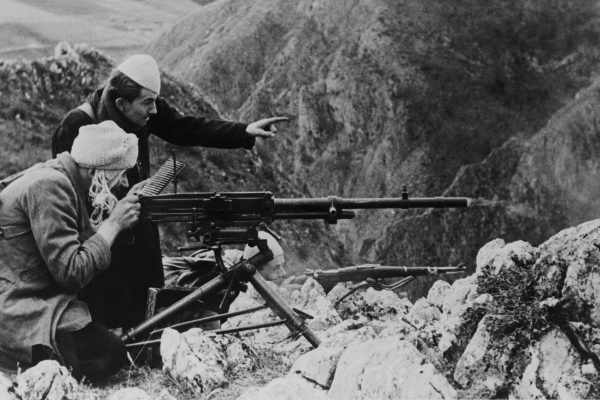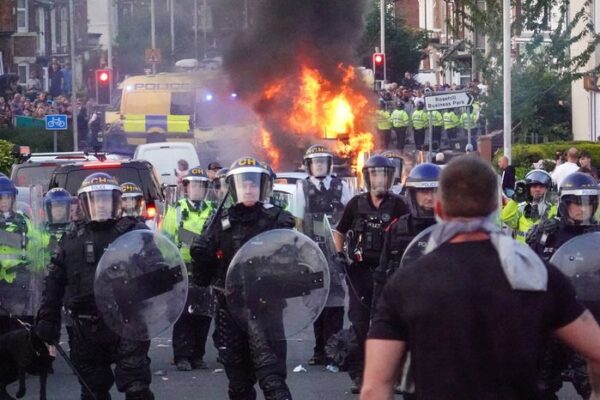Once we can self-reflectively engage with what Islam has to offer to modern Britain, many of us – as is already happening – will be able to overcome the many hurdles that veil us from seeing what we have in common. The proposed prayer space in Piccadilly Circus will only serve to enhance our tradition of being an open, tolerant, and welcoming society.
Once we can self-reflectively engage with what Islam has to offer to modern Britain, many of us – as is already happening – will be able to overcome the many hurdles that veil us from seeing what we have in common. The proposed prayer space in Piccadilly Circus will only serve to enhance our tradition of being an open, tolerant, and welcoming society.
A recent report by the Think Tank Theos has found that London is more religious than the rest of Britain. Faith, prayer, and religion are part of the very fabric of London.
Britain has an estimated 2000 mosques, with about a quarter of them in the capital. While this is dwarfed by the number of churches (an estimated 40,300), it is nonetheless an important part of civic life. These buildings can range from landmarks, such as the East London Mosque, but are more often than not terraced houses or single-rooms within larger buildings. Yet British Muslims are increasingly looking beyond the forms and functions of a traditional mosque, and are seeking to establish novel institutions that reflect the communities and localities they find themselves in.
This process has taken place elsewhere, thus in Muslim-majority countries, where alongside the mosque you also find the khanaqah, the zawiya, surau, or the nisha miski (the latter being the subject of a wonderful study by Jacqueline Fewkes). In Britain, Muslim ‘prayer rooms’ are an example of one such innovation, often named to indicate their outward-looking intentions to be comprehensible and inviting to the broader public.
In both cases, they play an important yet misunderstood role in civil society. One only needs to look at how communities who attend them have rallied together in the national struggle against the recent pandemic. They continue to provide food banks, support for those who are most vulnerable in society, and raise funds for healthcare equipment for our frontline staff. In fact, some of the first doctors and nurses to fall victim to the virus would have been people who regularly frequented mosques. They are quintessentially places of what academics like to call “social capital”. It is where people meet, build relationships, establish networks, and come together to support our thriving communities. This growth in places of worship defies expectations about an increasingly secular and irreligious Britain.
Having said so much, it is a sad reality that plans to build or extend such civil institutions are often faced with strong resistance. This can emerge in the form of violence, vandalism, arson, or through more bureaucratic resistance expressed in terms of planning permissions and concerns about parking. Often this resistance can be highly organised, for example, far-right groups have issued guidance on how communities can prevent new mosques being built, but at times it is a loose coalition of cultural conservatives, racists, and more active Islamophobes.
However, this resistance can be based purely on fear and negative media portrayals. People are often afraid of what they don’t understand. Which is understandable. Yet, they are a small vocal minority who do not necessarily represent the views of a decent majority who understand that we live in a liberal democracy that celebrates its unique and vibrant culture of tolerance.
The same pattern of this “loud” resistance can be seen in the discussion of a proposed place of worship in the basement of the Trocadero in Piccadilly Circus, London. The founders are keen to distinguish it from a traditional mosque, not only because it won’t be used for the five daily prayers of Muslims, but also because it will include a contemplation room, open to all. It is in many ways the type of institution one would expect to see in contemporary London: multi-faith, inclusive, and innovative, but without compromising on the distinctive religious affiliation from which it is born.
But being associated with Muslims is enough to provoke a strong response. The plans have led to petitions of objection from far-right groups and reactionary think-pieces from cultural conservatives.
It’s valuable to take a step back from the frenzied and almost Pavlovian response and consider the ways in which objections to such places are articulated. Fortunately, academics have long studied the conflict, controversy, and contestation over the building of new mosques and places of worship in Britain and abroad. They tend to boil down to three main objections.
The first is what can be termed “not in my backyard”, and deals with the issue of spatial transgression. Here the objection is articulated as being not about the mosque itself, but its location. Implicit in the argument is that mosques belong in certain parts of the city, the areas where Muslims are most visibly present, the “ghettos” or “ethnic enclaves”. The Muslim community of Britain are viewed not as equal citizens with equal claims to public space and visibility, but rather seen as second-class.
The building of a mosque in a location hitherto considered white, Christian, secularised, or liberal disturbs that imagined reality. It’s worthwhile to also consider whether the proposed project in Piccadilly, being an inclusive space established by Muslims but for people of all faiths, upsets the “natural order” in mind of those objecting.
The second frame of objection is about the role and function of a mosque. Muslims have thus far resisted the secularisation and privatisation of religion common in Britain, and so while the mosque is a place of worship, it is also a place of community – it binds the everyday and the sacred together. It is both private and public, it looks inward towards Muslims but outward to the wider population. Mosques tend to see themselves as part of their locality, not apart from it, and so rarely do they keep religion contained within the boundaries of what certain elements of British society consider to be the “polite” and “appropriate” space for mosques. This frustration, that the mosque behaves as a mosque and not like an Anglican Church, leads to a range of objections on the behaviour, function, and role of mosques.
The final form of objection relates to the imagined symbolism of a mosque. People can interpret the mosque as being representative of different things unrelated to the mosque itself. Some say that the mosque represents an imperial statement, a sort of conquest. Others say the mosque represents illiberal values of oppression of women or hatred of same-sex relationships, which reveals their own stereotypes about Muslims. Others still might say it represents a foreignness or something “un-British”, which is instructive of how they see Muslims as not belonging here.
The Picadilly project likewise presents an opportunity to represent the importance of religion to Londoners in the physical landscape of the city, providing space to both the devout rituals of Muslims or the Buddhist-inspired practice of mindfulness.
Yet all of these objections all relate to a single issue – where does Islam fit in modern Britain. As the academic Jocelyne Cesari articulates in an article on mosque conflicts in European cities:
“The arguments put forward on the local level to justify refusal [of mosques] are the same throughout Europe: noise and traffic nuisance, incompatibility with existing urban planning, non-conformity with existing security norms. But beyond these technical obstacles, the resistance to new mosques is always linked to a meta-narrative about Islam. This narrative, prevalent on the international level, also exists on the national level, and in many European countries; Islam is systematically conflated with threats to international or domestic order.”
It is helpful to briefly reflect upon what a prayer space or mosque actually is. This word is a translation of an Arabic word, masjid. This word comes from a tri-literal root s-j-d, or sajada, which literally means to prostrate. A masjid is where Muslims gather together to prostrate before God. Prostration, in a physical act of the forehead being placed on the ground, is to inculcate a spiritual internalisation of humility. In Islam, a believer submits to God. This submission and humility brings about the liberation of the soul. By being liberated from the constriction of the selfish self, one moves to the expanse of a loving God.
For Muslims, by humbling themselves before God, they are in a poetic sense, finding freedom. From this essence of the devotion of God comes everything else that flows from the mosque, whether social welfare projects or educational classes. These everyday acts of charity emerge from the desire to “prostrate” before God.
Prayer spaces like the one being proposed here are a reflection of the rich and diverse demographic of Britain itself, of a more confident, outward-facing, and organised Muslim community. A good example of this is the recently opened first eco-mosque in Europe in our own Cambridge. It’s an iconic mosque that combines Islamic and English architecture. It is quickly becoming a landmark of the British landscape and is open to visitors.
Many Muslims have already negotiated the question of what it means to be British and Muslim. They are keen for the wider British population to join them on this journey. It truly is a fascinating time to be living in Britain and Muslims have a rich tradition that provides a sense of stability at a time where many Brits are feeling – understandably – uncertain about their future.
Once we can self-reflectively engage with what Islam has to offer to modern Britain, many of us – as is already happening – will be able to overcome the many hurdles that veil us from seeing what we have in common. The proposed prayer space in Piccadilly Circus will only serve to enhance our tradition of being an open, tolerant, and welcoming society.
To support the Trocadero Prayer Space / Community Centre, please think about signing the following petition here.





